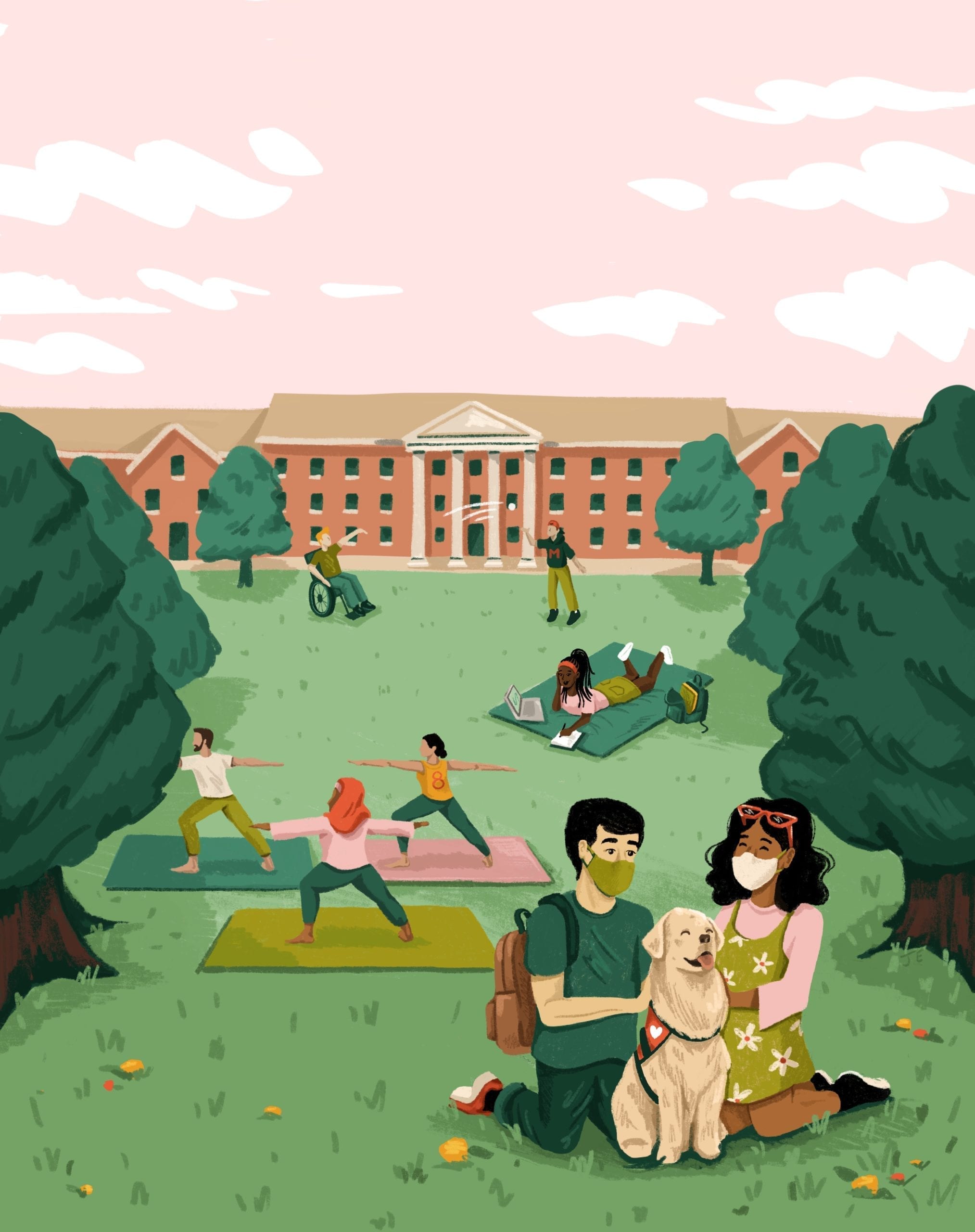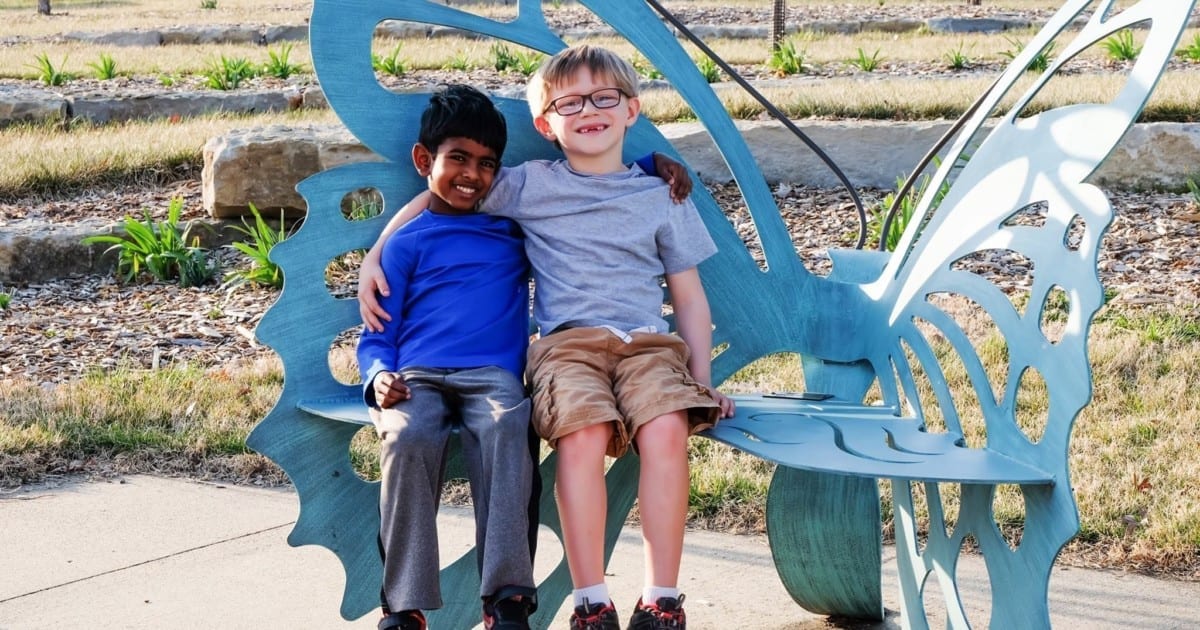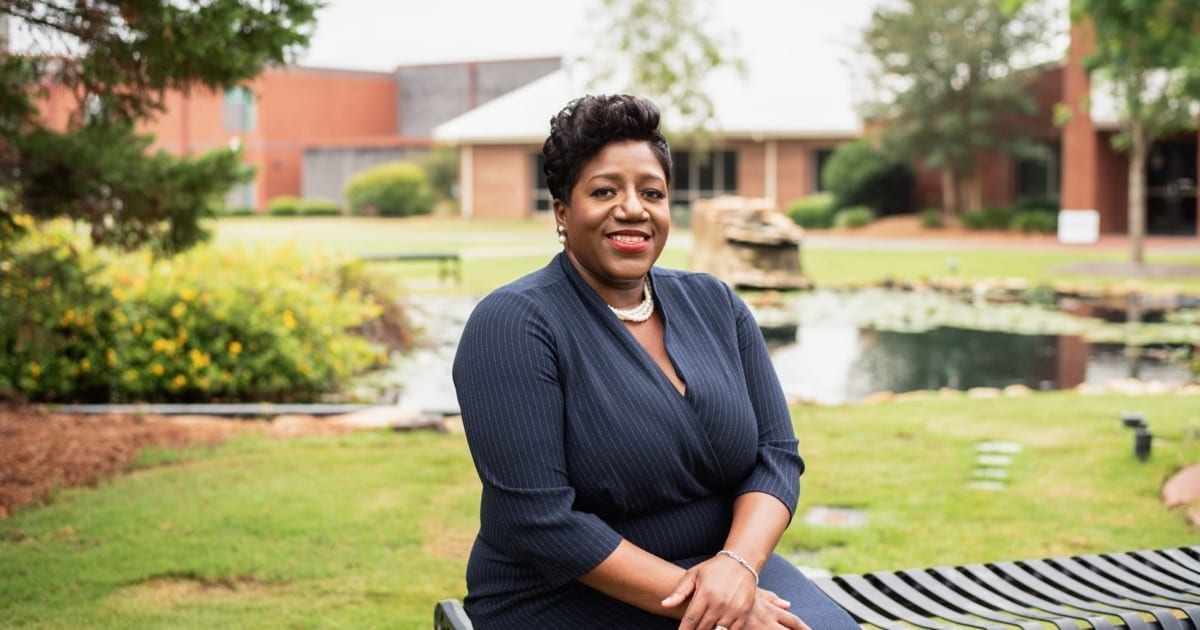Rachel Walker realizes she has it better than most college students whose 2019-2020 academic year was disrupted by COVID-19. As much as she likes Florida A&M University, she often felt a bit homesick for Atlanta. She has a close relationship with her family, so when COVID sent students packing mid-March, it wasn’t a tremendous hardship for her to finish the term at home.
But she appreciates that’s not true for everyone.
“Not everyone’s fortunate enough to have a good situation at home. They need someone to relate to, and listen,” says Walker, who is a psychology major and the incoming president of the Active Minds chapter at FAMU. During the COVID break, she said, chapter members have maintained a group text chat, something she feels is an important touchstone when people are far-flung in uncertain times. “It’s easy to get caught up with what’s going on as a nation right now, and we miss the little things we’d do subconsciously to check in with each other constantly. We take for granted that it’s important to check in and make sure everyone’s ok.”
The virus crisis hit campuses at a time that they were already struggling with student mental health. Suicide rates among youths ages 10 to 24 increased 56 percent in the 10-year period ending in 2017, according to CDC data. Chronic nationwide shortages of school mental health staff aren’t likely to get any easier with school budgets, shortfalls, and the pandemic economy.
While adjusting to remote learning, students are contending with the uncertainty of what their classes will look like next year. Home may or may not be a comfortable place for them to be, and they may or may not have access to mental health resources available to them at school. For some, all this is amplified by the loss of valuable scaffolding — a schedule and routine, an institution, and support community to rely upon. But for many, it’s also been a wake-up call that the one thing they have to rely upon consistently is, in fact, themselves.
And school faculty and administrators and mental health advocates want to support these self-help efforts. Because as they say, wherever you go in life, there you are.
“The pandemic has affected students in varied ways,” says Dr. Chetan Joshi, director for the counseling center at the University of Maryland, who through remote contact with students has observed an increase in efforts towards healthy eating, consistent sleep, exercising, and engaging in hobbies. “We have seen students slowly move towards bringing intentionality to their lives. This has been our consistent messaging to all students. You need to be intentional in establishing structure and engaging in healthy habits in this environment.”
Will Meek, director of counseling center at Brown University, agrees. “There’s a quality some students have when they’re starting to thrive, of either reading something or listening to podcasts or YouTubers or Instagram accounts tuned into ways they want to grow. They’re using those channels the way people used to use bibliotherapy — to enhance wellness, a new level of self-help,” he says. “I can audio stream contemplative opportunities, think about what I’m doing and be more reflective, be a part of more intentional communities — all that’s a part of embracing and taking ownership of your own wellness.”
Active Minds, a Washington-D.C.-based organization dedicated to student wellness, has seen signs of this ownership since it was founded in 2003. Its membership body consists of chapters established at more than 800 colleges, universities, and some high schools, where students use resources and programming to raise awareness of mental health among their peers.
“What we see in our student networks is that for a long time, they have been very aware that they can’t just rely on a campus counseling center,” says Laura Horne, chief program officer at Active Minds. “As early as 2012, we saw students organizing to help themselves and each other. They’ve worked to add 800 numbers like the National Suicide Prevention Lifeline to student ID cards. They’ve organized rideshare programs to help students who need longer-term counseling get off campus to where they need to go. They’ve advocated for more counselors on campus, and a greater diversity among counselors. And now we’re seeing them as advocates for technology like apps and online self-assessment tools for them to access, themselves.”
Horne points to programs different chapters have undertaken, some based upon resources and materials Active Minds makes available, and some of their own ingenuity. At Sacramento State, students who appreciate the importance of good sleep habits offer their peers “nap classes” to learn about the physical and psychological importance of getting enough rest. The Virginia Tech chapter offers a workshop on “Hokies Hiccups,” highlighting ways we grow through our mistakes. At U Penn, the chapter hosted a conversation about recovering from rejection — not being accepted into the fraternity or sorority you’d hoped for, not getting the internship you wanted, and what it really means in the longer narrative of life.
Rachel Walker of FAMU is part of a women’s support group called “Between Sistahs,” a twice-monthly open meeting of students, some women from greater Tallahassee, with representatives from the counseling center. “It’s a discussion group for things women are going through that they don’t always feel able to talk about with others — anxiety, being single mothers, all kinds of stresses in life,” she said. “Meetings start off very light in the beginning, to get everyone comfortable with each other, but they do get a little heavy at time, the things that are talked about. But everyone’s so supportive, it makes it a little lighter because of the nice people in the room.”
Drexel University is one of the schools taking advantage of Active Minds’ program called VAR — which stands for Validating, Appreciating, and Referring — which aims to help students recognize when friends are in trouble, and know best how to respond.
“Some students are uncomfortable when a friend talks about struggling, because they feel like they’re supposed to try to fix the problem, or minimize it, thinking that will make the friend feel better,” says Horne. Active Minds developed a package of educational resources and training for chapter members to share in campus workshops. “We’ve taken a broad approach to ‘referral’ to mean many kinds of self-care activities that might work for them.”
For Freya Lindvall, a junior at Franklin and Marshall and president of its chapter of Active Minds, having tools for helping peers is more than useful. It could be life-saving.
“My first year taking over presidency, there was a death of a student, and they asked me to come speak at her funeral about mental health. There needs to be a student bridge for the gap to break the stigma of talking to peers and being afraid of going for counseling,” she says. The aid students provide for a friend could be dramatic, like helping them find professional help, or commonplace support, which can make a tremendous difference. “The coaching we’re taught about VAR referrals could mean doing something for a struggling friend that’s as calming as saying, ‘I hear you. That’s hard. Let’s go watch a movie’. It might seem like a little. But it might mean a lot to them at the right time.”
Emma Smith, next year’s president of the Active Minds chapter at Drexel, is a big fan of the VAR program, in part because she knows friends have a critical point of access to the peers in their environment. “We did a presentation on it, and let folks know that 67 percent of peers turn to friends first when they’re feeling suicidal. It’s important to know how to respond to distress within a friend group, and this is a good introductory tool.”
There are many organizations currently working on putting tools for self-care — and self-awareness — in students’ hands. One of the new innovators is U-Thrive, an educational services firm beginning to contract with colleges to provide wellness programming that can be used in a wide variety of ways: self-paced online work, possibly a pre-requisite to coming to college; modules that can be facilitated with a faculty member, or resident advisor in a dorm; a credit-bearing course.
“Our ultimate hope is that this would help lighten the load at counseling centers by giving rich self-care information to students who might have lesser problems related to being stressed-out, but not suffering from a severe mental health issue,” says Simone Figeroa, the founder of U-Thrive. The full 16-module program is rooted in three pillars — positive psychology, mindfulness, and self-compassion. “We want to be a thought leader in helping students be more resilient, be their own advocate, and their own agent for change. This content is always needed, but especially now with remote learning and schools scrambling to create meaningful online content.”
The name U-Thrive was inspired by the book, U Thrive: How to Succeed in College (and Life), written by NYU instructors Dr. Alan Shlechter and Dan Lerner. The book is based on the extraordinarily popular course they teach together, “The Science of Happiness.” The conversational, communication-based course already offered the pair an inside look at college students’ well-being. The fact that the course continued remotely through the remainder of the spring, then through the summer term, gave them a front-row perspective on how students were handling quarantine.
“I think we were surprised at how effective it was from the get-go. We were able to see the chat fill up with people from halfway around the world and different time zones, willing to share how they were doing, hand icons going up, and the text box filling,” says Schlechter. “There’s data coming back now that we don’t learn as well online, particularly younger kids. But I think there are components of this medium that won’t go away. There are times when those Zoom classes, in this context of tremendous pressure and uncertainty when you don’t have anything else for connection, are like a cold glass of water on a hot day.”
Much of the wellness conversation in the class progressed from personal to the universal – and what you can do for your community. Lerner and Schlecter work from Martin Seligman’s Perma model of happiness (Positive Emotion, Engagement, Relationships, Meaning and Accomplishments). A cornerstone of their happiness work focuses on the sense of satisfaction and self-worth gained from helping others. “The definition of meaning is to be part of something greater than yourself. Being able to give back to a friend, a grandparent, your community,” says Lerner. “We ask, ‘How does what you do make the world a better place?’ When people think in that way, whether they’re going to help someone today, that tends to raise their level of meaning and purpose.”
Another focus of their class is achievement, which they define in two ways — and which is especially important in quarantine days when measured efforts are smaller than usual.
“We can mark achievement in two ways. Achievement with a capital A is, ‘I was accepted to college, I found a partner, I got a job.’ Wonderful things, but those aren’t going to happen every day, week, year,” says Lerner. The little A things are daily tangible tasks that give you a sense of satisfaction for having completed by day’s end. “What did I set out to do today, and did I accomplish it? I got the laundry done. I read a chapter. I got a haircut. We need a sense of purpose during these times. It might be accomplishing three things on your list, or four. But recognize you did it,” he says.
These are all tools in the practice of self-care — from meditation and mindfulness to yoga and gratitude journals — that may or may not resonate now, but students might come back to revisit later in life.
“We want to provide a variety of empirically sound interventions, and let them try them, and choose. I have a student who still gets in touch years later, saying, ‘I’m still meditating,’ and that’s what we’re striving for,” says Schlecter. “Find what works for the individual to use now, or in the future think back and say to themselves, ‘That mindfulness thing that didn’t work for me when I was in college? Let’s try that again and see if there’s anything in that for me.’ ”
Above all, students need not to have their form of self-care be a source of additional stress: the sense that they’re not doing the right thing.
“Students are dealing with the anxiety of this time in very different ways, and it took me awhile to appreciate that,” says Madeline Nash, a counselor at Truman State University in Kirksville, Missouri. When students went home and the counseling sessions began to be conducted remotely, she initially advised them to think about a new hobby or something fun they could do with their spare time. After a few weeks of speaking with students, she realized this wasn’t the reality for those who were struggling in lower income households, taking on extra jobs that conflicted with class schedules, and dealing with food insecurity. It also wasn’t helpful for students who experienced a pressure in not doing COVID right — not learning a new language or taking up guitar or baking the perfect sourdough.
“For high-achieving students, there was anxiety in the expectations of accomplishment during their free time, when a lot of that so-called free time was spent worrying, or even getting some extra sleep,” she says. For some, the lack of structure wreaks havoc with impulse control. “I had to tell them things like, ‘This might not be the best time for Tinder hookups, let’s slow that down.’ And, ‘Now is not the time to be experimenting with hallucinogens, let’s back it up on that.”
Even when it came to healthy strategies, like exercise and mindfulness, she came to see that many students had an unrealistic expectation of what it would accomplish if they were doing it “right.”
“Many students are doing a phenomenal job of taking ownership and control of their mental health, but they have this expectation that if they’re doing it right, they won’t experience discomfort,” says Nash. “So I talk to them about how you can do this perfectly and you’ll still experience discomfort. If your goal is never to experience discomfort you will fail.”
The goal, she says, is becoming comfortable with uncomfortable feelings, and having the skills to navigate it.
“That’s much more powerful than never being uncomfortable.”




